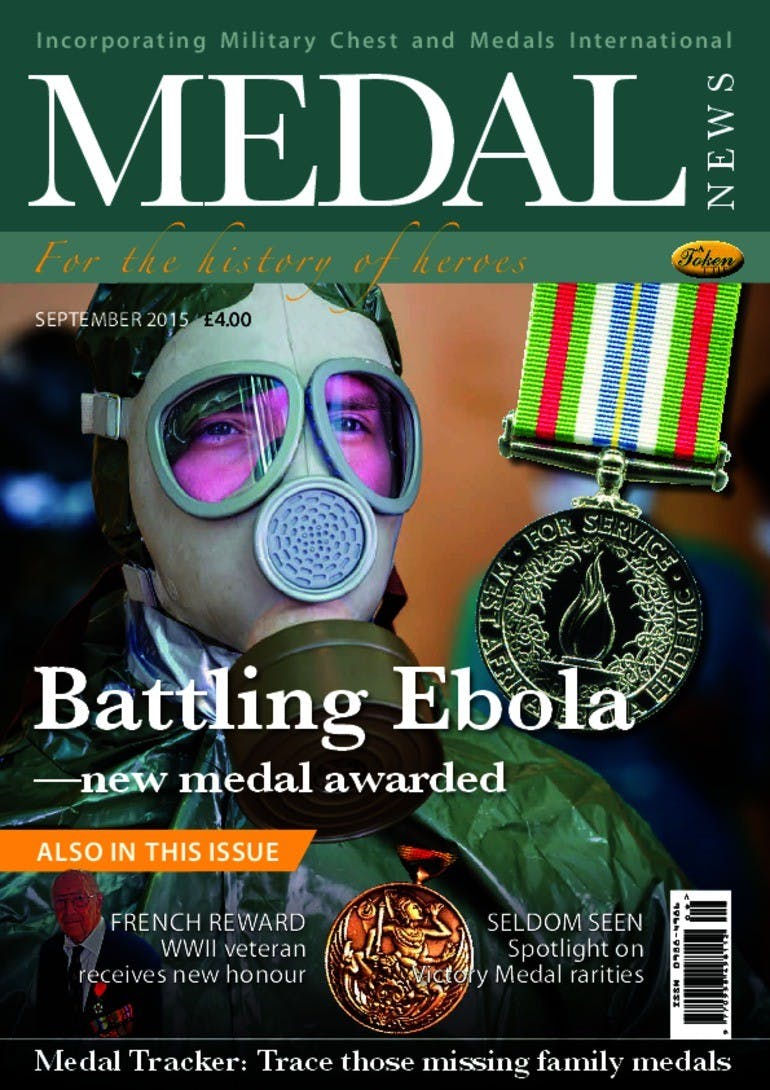Battling Ebola - NO LONGER AVAILABLE
Volume 53, Number 8, September 2015
Put up or shut up THE recent 70th anniversary of VJ day celebrations, televised for all to see, reminded us once again how frail and few in number the remaining veterans of World War II actually are and we all know that come the 75th anniversary there will barely be a handful of them, or indeed any World War II veterans left at all. Age has wearied them, the years have condemned them to frailty and disability and soon they will join those who never made it home in 1945. Of course, many of those whose comrades paraded last week, but who didn’t make it home themselves, were not cut down on a battlefield or killed directly by any human enemy but rather they died emaciated and disease-ridden in a Japanese prisoner of war camp, victims of some of the most barbarous war crimes of that conflict. As the numbers of those who survived the horrendous conditions of the PoW camps dwindles there are calls once again for their heroism in the face of such adversity to be recognised medallically, just as those who endured the hardships of the Arctic have been recognised—and of course those making such calls have a point. I have said before that the institution of the Arctic Star was going to set a precedent and, whilst it would please those who have received it, it was sure to anger those who believed their sacrifice, endurance and heroism was at least equal to those who served in the icy northern waters. The fact that the Russians awarded medals to convoy veterans was always used as a stick to beat the British Government with, a sort of “look, even the Soviets can thank the vets but our own government can’t”. But the argument was invalid, the Russians awarded (and still award) medals to men who helped them with their war effort—that seems perfectly logical and OK and cannot really have ever been a reason for the Brits to follow suit. But apparently it was and as soon as the Arctic Star was instituted it was a sign from the Government that they believed the sacrifice and hardships endured in the Arctic circle were more worthy of a medal than those who had fought their way across the beaches on June 6, 1944, in the face of relentless machine gun fire and artillery shells, or who languished in the hellholes of the jungle, forced to work for their Japanese masters on half a bowl of filthy rice a day. Were the Arctic Convoy veterans braver than the men who flew the Horsa gliders and captured Pegasus bridge, thus ensuring the success of Operation Overlord? Or braver than those men who jumped at Arnhem and were captured after days of house to house fighting? Were they braver than the men who endured dysentery, daily beatings and flesh eating ulcers as they worked on the Burma railway? Of course not—they were all incredibly brave men and where they ended up depended entirely on which regiment, ship or unit they were with and where they were based . . . a quirk of fate not heroism. However, the institution of the Arctic Star seemed to say otherwise. I personally do not agree with retrospective medals unless (as in the case of the early MGS and NGS medals) absolutely no medallic recognition was given at all. However, once it has been decided that a medal is to be awarded, for whatever reason, then I will 100 per cent support the efforts of the men who are to receive them to actually get them before it is too late. One of the biggest issues with the Arctic Star was the fact that so many did not live to receive it, even after its institution had been announced—and the current debacle with the French Government and the Legion d’Honneur for Normandy veterans is simply unacceptable. It was announced in 2014 that all surviving Normandy vets would receive France’s highest honour and yet red tape and bureaucracy has held up the awards to such an extent that it is estimated that since the initial announcement nearly 1,000 have died without seeing the medal—with many more sure to follow, as the group, with an average age of 95, simply fades away. Thus, I beseech the British Government, and all those campaigning for medallic recognition for whichever group it may be, if you’re going to do it, do it now. If you’re not, then stop talking about it. Do not dangle the possibility of a new medal in front of these old boys only for them to die before they can receive it. That is especially cruel—and they of all people do not deserve to be treated that way. They deserve only our respect. And our remembrance.
Order Back Issue
You can order this item as a back issue, simply click the button below to add it to your shopping basket.

